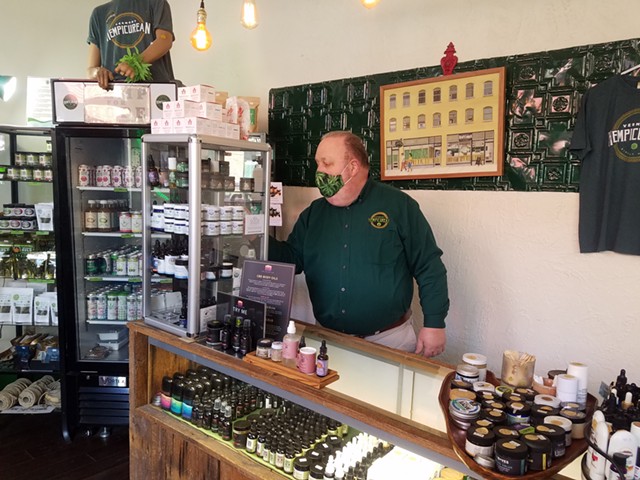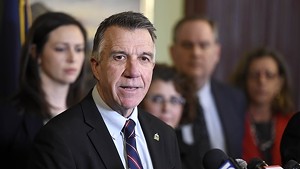
- Courtesy of Travis Stout
- Scott Sparks in his Brattleboro store, Vermont Hempicurean
The
Evansville Trading Post, a general store in the small town of Brownington, has adapted over the years to stay afloat. These days, its wares include food, fuel, fishing licenses and furniture.
Thanks to the town's voters, store owners Andrew and Kelly Swett hope to add cannabis to that list — not the CBD that’s already available on the counter, but the THC-containing products that people use to get high.
“Things aren’t going so great in retail,” said Andrew, who was relieved on Wednesday to learn that the town had voted to allow commercial cannabis establishments, a move made possible by a bill passed last year. “It would be helpful.”
About two dozen Vermont towns considered similar measures on Town Meeting Day, and almost all passed them.
Under Vermont's 2020 law, municipalities must opt in to the adult-use marijuana marketplace through a public vote before any sales can occur. The law allows the state’s existing medical marijuana dispensaries to obtain licenses to manufacture and sell cannabis products to the public starting in May 2022. Other outlets granted retail licensees won't be able to sell until October 2022.
The towns that put the measure to a vote Tuesday are widely spread around the state, and included the large — such as Burlington, which approved the measure by a wide margin — and the small. Burke passed the measure by a vote of 133 to 130, according to the town’s treasurer.
Only three municipalities — Newport City, Richmond, and Lyndon — rejected it, according to early counts. Results from Ludlow were not yet available Wednesday.
The measure passed in Burlington doesn’t allow any marijuana sales until October 2022.
Andrew said he’s already working with one CBD supplier with whom he’d like to partner for the marijuana business. He thinks another entrepreneur who was eying Newport City will probably also try to set up shop in Brownington after that city said no to marijuana sales.
“We’re probably not going to be the only one in town,” he said. “I think it would help business in general.”
Only about 10 percent of Vermont municipalities put the matter up for a vote. More should have, said lawyer Tim Fair, who saw the results as representative of the state at large. Fair is a founder of the Burlington law firm Vermont Cannabis Solutions.
“One of the big surprises for me in this process is how the selectboards were adamantly opposed to putting this vote to the people,” Fair said. “We’re a representative democracy. We can’t agree on anything anymore, yet almost 70 percent of Vermonters agree we want a legal cannabis industry.”
Selectboards weren’t the only ones opposed. Pathologist Catherine Antley campaigned against retail sales in Middlebury, which approved the measure by a wide margin. Antley said the industry cannot be successfully regulated, and that cases involving organized crime quadrupled in Colorado after commercial marijuana was legalized. “How many Vermonters know that there is essentially no profit in the industry without the creation and maintenance of addiction,” Antley wrote in an email, adding that the industry targets young people.
Before stores can sell cannabis, the governor has to appoint a Cannabis Control Board, whose members would be full-time state employees. That process is already behind schedule. The board members’ terms were due to start January 19, but Gov. Phil Scott hasn’t yet named his choices. The law calls for the board to recommend certain fees by April 1, and to begin making rules for cannabis establishments by June 1.
Scott has been forthright with his concerns about legalizing marijuana, saying there is more work to be done in the areas of road safety, racial equity and the prevention of misuse. He allowed the legislature’s tax-and-regulate bill to become law without his signature last fall.
Eli Harrington, a Burlington-area cannabis activist who runs a website called Vermontijuana, noted that the town where the governor lives, Berlin, voted to allow commercial marijuana sales.
“Hopefully it’s a little kick in the ass for this commission to form, because that’s really what is holding things up,” Harrington said.
When things do get under way, Scott Sparks, who owns the Vermont Hempicurean CBD store in Brattleboro, has big expansion plans. Along with opening an adult-use marijuana store, he’d like to create a test kitchen to concoct edible marijuana products, expand his sales of cannabis growing supplies, and create an area for growing plants as a demonstration for visitors. He envisions the latter as a “Ben & Jerry’s-type thing for people who haven’t seen cannabis growing before.”

















Comments
Comments are closed.
From 2014-2020, Seven Days allowed readers to comment on all stories posted on our website. While we've appreciated the suggestions and insights, right now Seven Days is prioritizing our core mission — producing high-quality, responsible local journalism — over moderating online debates between readers.
To criticize, correct or praise our reporting, please send us a letter to the editor or send us a tip. We’ll check it out and report the results.
Online comments may return when we have better tech tools for managing them. Thanks for reading.